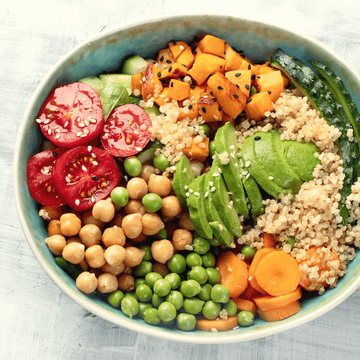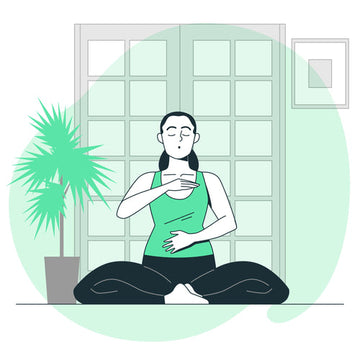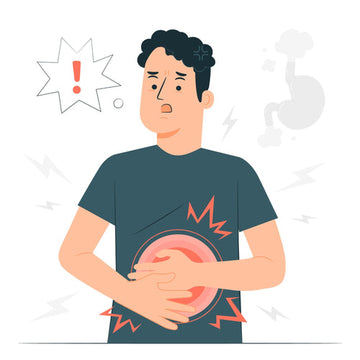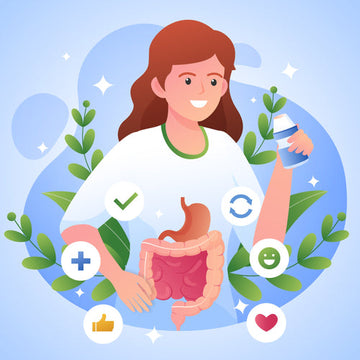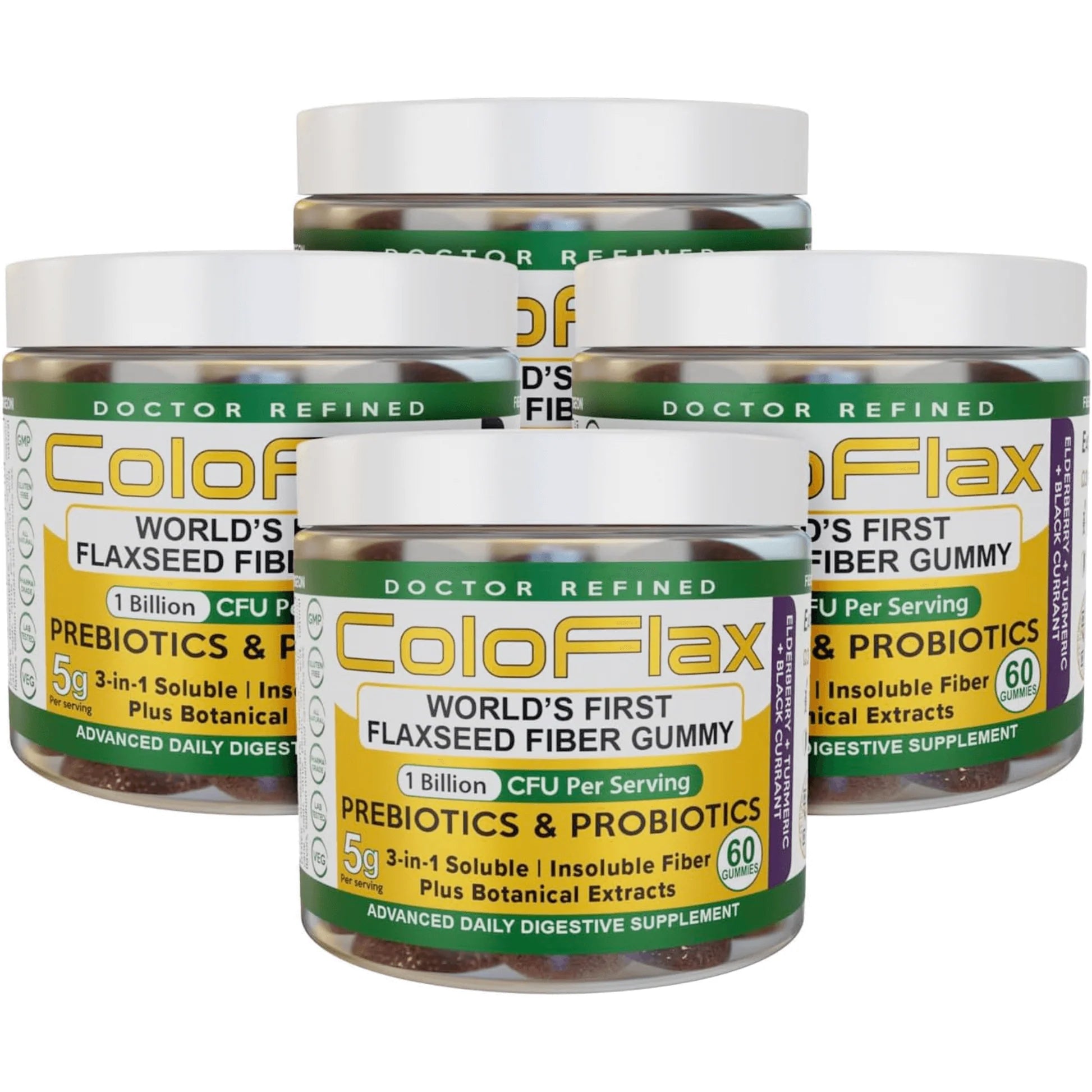The vegan diet is held in high regard by nutritionists and medical experts alike. Studies suggest that it could help to promote weight loss, reduce the risk of heart disease, and lower all-cause mortality. (1)
But for every advocate who professes the benefits of a vegan diet, there are detractors who warn about reduced nutrient intake, specifically in relation to B vitamins and iron.
So, what’s the truth?
We’ll look at the pros and cons of a vegan diet while also covering the effects of following this diet in the long term.
What are the Benefits of a Vegan Diet?
Adopting a vegan diet can greatly reduce your carbon footprint, as meat and dairy farming have a massive impact on the environment. (2)
It’s also better for the animals, for obvious reasons.
But let’s put the moral and environmental reasons aside and focus purely on the health benefits of the vegan diet.
1. It’s Good for Your Gut

It has been estimated that up to 95% of Americans don’t eat enough fiber. With the average being around 16g, notably less than the 25g+ that adults should consume. (3)
Americans eat too much processed food, and processed food has very little fiber. The average American also eats large quantities of meat and dairy, neither of which contain a lot of fiber.
Adopting the vegan diet won’t automatically fix this issue. It’s still possible to eat low-fiber and unhealthy foods while abstaining from meat and dairy. But it means you’re forced to find your calories elsewhere and may rely more on fruits, vegetables, beans, legumes, seeds, and other high-fiber foods.
As a result, you’re less likely to suffer from the issues associated with a low-fiber diet, including regular bouts of constipation.
2. It Could Lower Your Cholesterol

High cholesterol can leave fatty deposits in your bloodstream, restrict circulation, and greatly increase the risk of heart disease and stroke. (4)
Eating a diet that’s high in saturated fat is one of the main causes of high cholesterol. It’s also more likely to be diagnosed in people who are overweight. If you eat a vegan diet, you are naturally abstaining from many of the foods that cause high cholesterol.
Even if you have already been diagnosed with high cholesterol, a vegan diet could help to bring those numbers down. Studies show that individuals who follow a strict vegan diet report notably lower levels of LDL (“bad”) cholesterol, with some recording a reduction of 25%. (5)
3. It Could Improve Your Heart Health

Not only can a vegan diet contribute to lower cholesterol, but it can also reduce the risk of heart disease in general.
Heart disease is the leading cause of death in the United States. It kills more people than accidents, Alzheimer’s disease, diabetes, and chronic lower respiratory diseases combined. It’s also one of the most preventable causes of death, as it’s mainly linked to diet and lifestyle. (6)
A study published in 2019 looked at the effects of plant-based diets on middle-aged participants. It noted that there was a 16% reduction in cardiovascular disease for individuals eating a plant-based diet. They also experienced a 31% to 32% reduction in cardiovascular disease mortality and an 18% to 25% lower risk of all‐cause mortality. (7)
4. You Might Lose Weight

Vegans are often stereotyped as being slim and slight. In truth, vegans can be any shape and size. There are even many vegan powerlifters, bodybuilders, and strength athletes. However, they do tend to be slimmer than their carnivorous counterparts, and that’s unsurprising when you consider the quality of the food they eat.
Vegans can and do still eat processed food, and this is one of the biggest causes of obesity in the United States. Processed food is low in fiber, high in fat, and high in sugar—all the things that are bad for you. However, the fact that they can’t eat meat, dairy, or animal derivatives means vegans tend to pay more attention to how their food is cooked and prepared, as well as what it contains.
Technically, fast food fries are vegan, as are fried pies made with vegetable oils. But many processed foods and fast foods are cooked on surfaces where meat/dairy is prepared or in oil that has cooked meat/dairy.
If you abstain from processed food, swap calorie-dense meat for high-volume vegetables, and greatly increase your fiber intake, you will naturally gain less weight.
But that doesn’t mean you can eat what you want. After all, sugar, alcohol, vegetable oil, and bread are all vegan, and they are also incredibly high in calories.
5. It Could Improve Your Memory and Cognition

The vegan diet may help to keep your brain strong and could aid with lowering the risk of many degenerative conditions. We know that a high intake of dietary antioxidants can contribute to reduced cognitive impairment and improved cognition, and the average vegan diet is much higher in these compounds.
Of course, you don’t need to go vegan to get your fill of antioxidants or even to eat lots of fruits and vegetables. But once you remove calories from meat and dairy, you have to get them from somewhere, and many vegans turn to nutrient-dense and antioxidant-rich plant-based sources.
What are the Risks of a Vegan Diet?
There are definitely more pros than cons when it comes to a vegan diet. But it’s not perfect, and there are a few things you need to keep in mind.
1. Soy is a Problematic Protein Source
On a macro level, soy is fantastic. It’s often added to beef up the protein content of vegan foods and you’ll find it in many meat alternatives as well. In moderation, it’s perfectly fine, but there are some health concerns regarding excessive consumption.
High concentrations of soy may interfere with the body’s hormones, impacting fertility and sexual development, among other things. (8)
What’s more, many soy-based meat replacements are highly processed. It’s easy to look at these foods and assume they are healthier than meat-based alternatives. And if you focus on the saturated fat content, they often are. But they are far from fresh or natural and they undergo a lot of processing to create something that looks, feels, and tastes like meat.
There’s nothing wrong with consuming these foods in moderation, but they shouldn’t form a major part of your diet. Rather than seeing them as replacements for lean chicken, beef, and other meats, consider them as a replacement for fast food.
2. There is a Risk of Anemia
Vegans are at high risk for low heme iron. There are plant-based sources of iron, but it’s not the same as the iron found in meat. This isn’t usually a problem for men, especially if they supplement with iron tablets, but it can be a problem for girls and women.
If you’re on a vegan diet and you’re worried about your iron levels, consult your doctor. They can run some tests and prescribe an iron supplement to help you out. There are some minor side effects associated with these supplements, but it’s often better than the alternative, especially when you consider that the “alternative” can be anemia.
3. It’s Difficult to Get Quality Omega-3 Fatty Acids
Fish is the best source of omega-3 fatty acids, which have been linked to a host of health benefits. There are plant-based sources, but they are not as readily available. What’s more, health experts recommend maintaining a good balance between omega-3 and omega-6 fatty acids, and the increased consumption of nuts (high in omega-6) may create an imbalance.
The best vegan sources of omega-3 fatty acids include chia seeds, hemp seeds, flaxseeds (as with our ColoFlax Fiber Gummy), edamame, and seaweed. You will also get a high dose of omega-3 fatty acids from algae like spirulina, a foodstuff that has been likened to a natural multivitamin.
4. The Vegan Diet is Low in B12
Vitamin B12 is naturally present in many foods of animal origin, including eggs, poultry, and milk. No animal foods mean no vitamin B12. Fortunately, this is one of the easiest fixes. Not only are B12 vitamins cheap, effective, and widely available, but numerous foods targeted toward vegans have been fortified with this vitamin.
If you drink soy milk, there’s a good chance it contains some added B12. You will also find it in breakfast cereals and many other foods. If not, just pick up a B12 supplement.
If you are supplementing with B12 and are still experiencing some of the symptoms of deficiency, consult a doctor. There is a genetic variation that can impact how this vitamin is absorbed. If you have this variation, you may be deficient even if you are taking a seemingly adequate dose of a B12 supplement.
5. Vegans May Be Low in Zinc
Although iron and B12 are the main concerns, vegans can also be deficient in zinc. The problem is not a lack of consumption but limited absorption. It is thought that consuming many plant foods increases the intake of phytic acid, which could inhibit the body’s ability to absorb this mineral.
Fortunately, as with B12, this is an easy fix. Simply increase your zinc consumption beyond what is recommended. You don’t need to go too high—50% above the usual DV is enough.
You can get zinc from beans and legumes, as well as nuts, seeds, tofu, and fortified products. If that’s not enough, pick up a zinc supplement. It’s important not to overdo it though as you may experience adverse health effects from taking too much zinc.
Summary: Is the Vegan Diet Healthy in the Long Term?
The vegan diet could improve your heart health and reduce your risk of numerous chronic conditions. You could live longer, feel better, and make a difference to the planet at the same time.
But it’s not perfect. There are some nutrient deficiencies to consider and it’s important to think about what you’re eating and consume a balanced diet rich in all macro and micronutrients.
The fact that it’s not perfect isn’t a fair criticism, though. You could say the same about most other diets, including the average American diet, which is low in fiber, high in sugar and saturated fat, and contains suboptimal levels of many vitamins and minerals. If you’re rejecting the vegan diet because it’s not perfect, make sure you’re hitting all the right nutrient notes with your existing diet.
If not, and you want a diet that encourages you to eat well, improves digestive health and heart health and could add years to your life, give veganism a go.
References
- https://www.tandfonline.com/doi/full/10.1080/10408398.2022.2075311
- https://www.science.org/doi/10.1126/science.aaq0216
- https://www.ncbi.nlm.nih.gov/pmc/articles/PMC6124841/
- https://www.mayoclinic.org/diseases-conditions/high-blood-cholesterol/symptoms-causes/syc-20350800
- https://www.ajconline.org/article/S0002-9149(09)01099-6/fulltext
- https://www.cdc.gov/nchs/fastats/leading-causes-of-death.htm
- https://www.ahajournals.org/doi/10.1161/JAHA.119.012865
- https://pubmed.ncbi.nlm.nih.gov/25587246/

